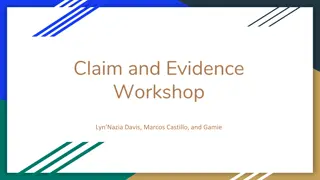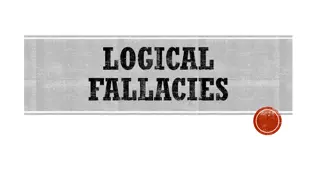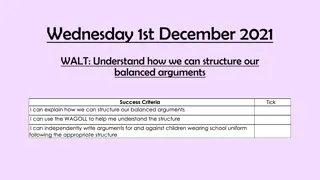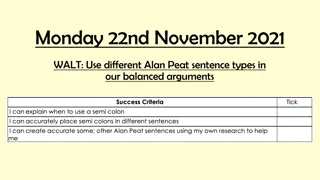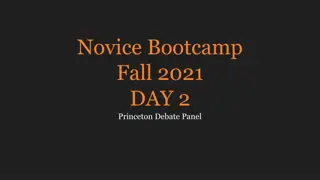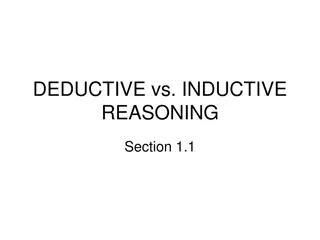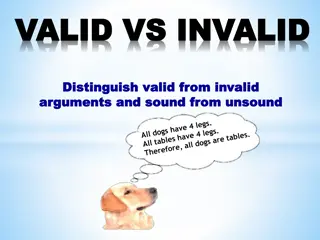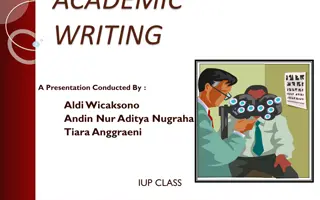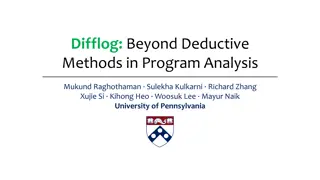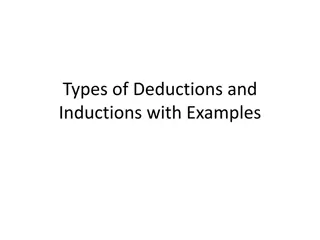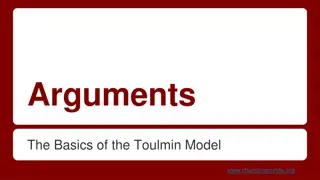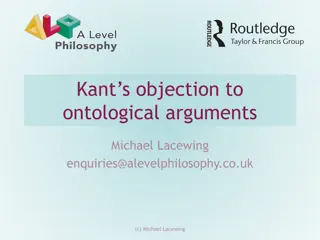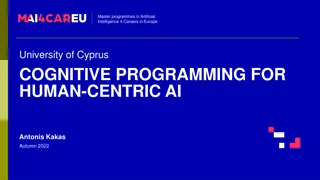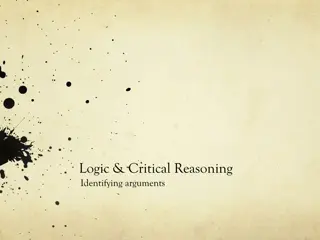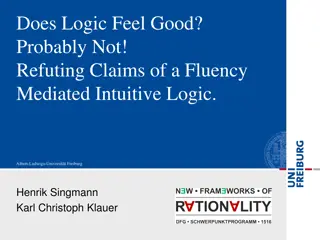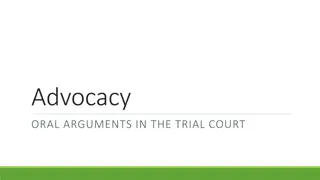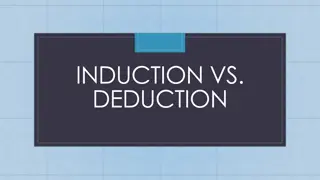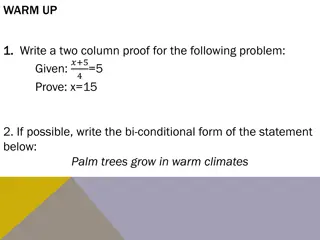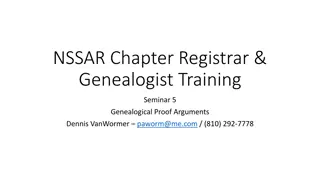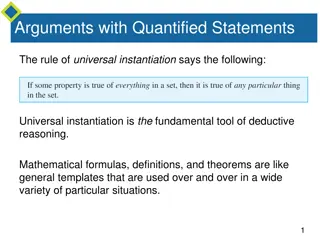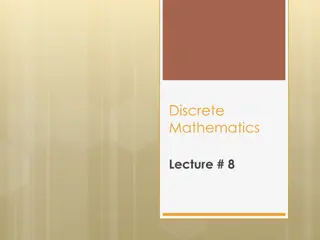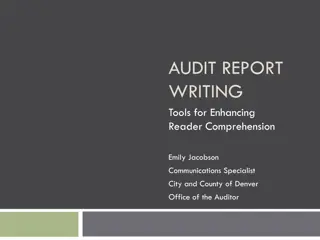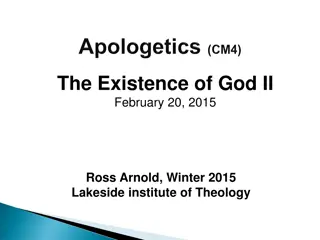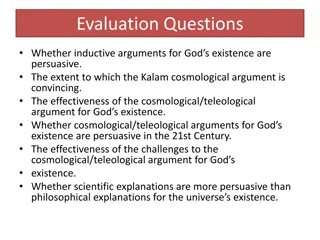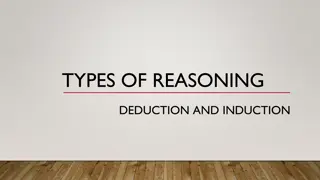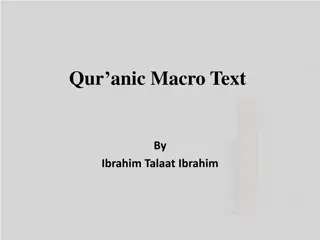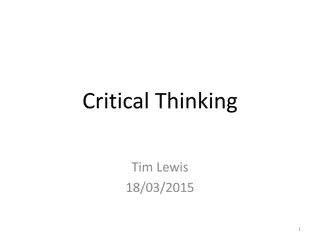Understanding Logical Form and Equivalence in Conditional Statements
Delve into the intricacies of logical form, equivalence, and compound statements in the realm of propositional logic. Explore valid and invalid arguments, conditional statements, and the logic of compound statements with puzzles to sharpen your logical reasoning skills. Unravel scenarios like determ
2 views • 81 slides
Debate on Driving Skills: Are Women Better Drivers Than Men?
In this lesson students examine the debate on whether women make better drivers than men. The essay explores different perspectives, highlighting qualities such as patience and responsibility in women that may contribute to safer driving. Conversely, arguments against women drivers focus on perceive
2 views • 12 slides
Understanding Inductive and Deductive Reasoning
Inductive reasoning involves drawing general conclusions from specific observations, while deductive reasoning starts with general premises to derive specific conclusions. Induction uses experience or experimental evidence to make broad conclusions, while deduction follows from general to specific.
5 views • 7 slides
Mastering the Toulmin Method for Constructing Persuasive Arguments
Learn how to effectively structure arguments using the Toulmin Method, which consists of Claim, Data, Warrant, Backing, Counterclaim, and Rebuttal elements. Explore reasoning and logic concepts, differentiate between inductive and deductive reasoning, and understand how to construct valid arguments
0 views • 30 slides
Identifying Logical Fallacies: Understanding Poor Reasoning
Logical fallacies are errors in reasoning that can occur in formal or informal arguments. Examples include appeals to authority, appeal to the majority, appeal to pity, and appeal to force. Understanding these fallacies can help in recognizing and avoiding flawed arguments.
0 views • 22 slides
Understanding the Structure of Balanced Arguments
Explore the concept of using the third person in writing balanced arguments to maintain objectivity and structure. Learn about third person pronouns and the importance of being unbiased in your writing. Understand the significance of structuring your arguments and maintaining a clear order for effec
0 views • 11 slides
Mastering Alan Peat's Balanced Arguments with Different Sentence Types
Explore the use of various Alan Peat sentence types in crafting balanced arguments, focusing on incorporating semi-colons effectively. Engage in interactive activities and practice sessions to enhance your skills in creating compelling arguments. Dive into examples and exercises to refine your under
2 views • 12 slides
Mastering Debate: Essential Strategies and Techniques
Learn key concepts like argument structure, points of clarification, and how to make compelling arguments in a debate setting. Discover the importance of warrants, impacts, and implications in formulating strong arguments. Explore tips on coming up with effective arguments and understanding differen
0 views • 47 slides
Mastering Final Focus in Debates
Final Focus, a crucial 2-minute speech at the end of a debate, serves as your last chance to persuade the judge of your victory. It involves comparing key voters and emphasizing the impact of your arguments. Weighing key voters is essential, with a focus on demonstrating why the scale tips in your f
1 views • 4 slides
Understanding Deductive Reasoning and Problem Solving in Logic
Explore the concepts of deductive reasoning, problem-solving logic, and Venn diagrams in this informative content. Learn about the process of drawing conclusions from known facts, using syllogisms to make valid arguments, and understanding the difference between truth and validity in deductive reaso
7 views • 16 slides
Understanding Reasonable Arguments vs. Pseudo-Arguments
The provided content focuses on distinguishing between reasonable arguments and pseudo-arguments through thought-provoking questions such as the ethical treatment of animals, city subsidies for sports venues, and subjective opinions on aesthetics. It also explains the structure of an argument, highl
0 views • 18 slides
Understanding Valid and Invalid Arguments in Logic
In logic, arguments consist of premises supporting a conclusion, with deductive arguments claiming logical necessity. Valid arguments have premises implying the conclusion, making them deductively valid. For example, if all actors are robots and Tom Cruise is an actor, then logically Tom Cruise must
0 views • 25 slides
An Examination of Ontological Arguments for God's Necessary Existence
Various ontological arguments, such as Malcolm's and Anselm's, propose that the existence of God is logically necessary, grounded in the concept of God as the greatest possible being. These arguments challenge the coherence of the concept of God and counter objections, like Kant's claim that existen
2 views • 10 slides
Mastering the Art of Academic Writing
Understand the essence of academic writing, focusing on problem-solving, deductive reasoning, and evidence-based arguments. Learn the purpose, methodology, and key tips to enhance your writing quality and presentation in academic settings.
1 views • 21 slides
Advancements in Program Analysis Beyond Deductive Methods
Explore the evolution of program analysis beyond deductive methods with innovative tools like static analyzers and data-driven analysis design. Discover the challenges faced, such as undecidable analysis questions and scalability issues, and the strategies employed to address them. Learn about the s
0 views • 24 slides
Understanding Deductive and Inductive Reasoning
Explore the world of deductive and inductive arguments through examples of deductive reasoning based on definitions and math, including categorical syllogisms, hypothetical syllogisms, and disjunctive syllogisms. Delve into inductive reasoning and the key distinctions between deductive and inductive
0 views • 26 slides
Understanding the Toulmin Model for Effective Argumentation
The Toulmin Model provides a structured approach to crafting and evaluating arguments, consisting of key components like claims, grounds/data, and warrants. It emphasizes the importance of using evidence and reasoning to support claims effectively. By understanding this model, one can enhance the pe
0 views • 13 slides
Kant's Critique of Ontological Arguments
An exploration of Kant's objection to ontological arguments, examining the flaws in the reasoning of Anselm and Descartes. Kant argues that existence is not a predicate and does not enhance the concept of a being. Therefore, ontological arguments cannot prove the existence of God solely through conc
0 views • 7 slides
Understanding Argumentation and Realization in AI Master Programmes
Exploring the concept of argumentation and its realization in artificial intelligence master programmes, focusing on the construction, evaluation, and implementation of arguments through cognitive programming. The framework involves structured argumentation, conflict relations, and strength/preferen
1 views • 31 slides
Understanding Logic and Critical Reasoning: Identifying Arguments
In the study of logic and critical reasoning, identifying arguments is a fundamental task. Arguments consist of premises supporting a conclusion, and they can be identified by specific indicators and techniques. Understanding argument structure and types of support, such as deductive and inductive,
2 views • 15 slides
Understanding Deductive Reasoning and Intuitive Logic
Deductive reasoning involves assessing the validity of arguments based on premises, while fluency-mediated intuitive logic suggests people have an intuitive sense of logicality. Challenges arise in drawing correct conclusions from abstract syllogisms, indicating a need for deliberate and effortful p
0 views • 24 slides
Guide to Oral Arguments in Trial Court
Learn how to conduct oral arguments in a trial court, including the steps for both the movant and respondent, strategies for making strong arguments, and tips for responding effectively. This comprehensive guide covers the dos and don'ts of oral arguments, emphasizing the importance of preparation,
0 views • 9 slides
Supporters of Slavery in the 19th Century: Legal, Religious, and Economic Arguments
In the 19th century, defenders of slavery utilized legal arguments by denying citizenship rights to blacks, religious arguments by justifying ownership and guidance through biblical references, and economic arguments by comparing treatment of slaves in the South to conditions of workers in the North
0 views • 4 slides
Understanding Command-line Arguments and Errors
Learn how to utilize command-line arguments in Python scripts to enhance flexibility and parametrize functions for various inputs. Explore ways to access and utilize command-line arguments effectively, while handling errors gracefully.
0 views • 30 slides
Understanding Deductive and Inductive Reasoning in Problem-Solving
Explore the differences between deduction and induction in problem-solving approaches. Deductive reasoning starts with a general statement and moves to specifics, offering certainty and objectivity, while inductive reasoning begins with specifics and arrives at a generalization, providing flexibilit
0 views • 11 slides
Analyzing Arguments in English Debates: A Critical Approach
Explore and critique various arguments presented in English debates, including topics like dietary recommendations, digestion issues with Japanese rice, and driving skills in different weather conditions. Learn how to evaluate evidence, causality, and persuasiveness in arguments to develop critical
0 views • 19 slides
Logic in Mathematics and Deductive Reasoning
Delve into the principles of logical deduction in mathematics through examples of conditional statements, syllogisms, and proofs. Explore how deductive reasoning can lead to valid conclusions based on given premises.
0 views • 12 slides
Mastering Academic Writing Moves: The Art of Summarizing
In academic writing, mastering the art of summarizing is crucial for persuasive arguments. By engaging in dialogue with others and summarizing their arguments, writers can strengthen their position. It is important to strike a balance between the original author's ideas and your own, emphasizing asp
0 views • 15 slides
Understanding Economic Models: Assumptions, Deductive Reasoning, and Logical Fallacies
Economic models utilize deductive reasoning to simplify real-world economic relationships. Assumptions vs. implications are key components, where assumptions reflect reality or are simplifying. This process helps identify conditions for specific outcomes to occur and distinguishes between consequent
2 views • 17 slides
An Overview of Debate: Propositions, Teams, and Formats
Debate is a regulated discussion between two matched sides discussing a proposition, with the affirmative arguing for change and the negative defending the status quo. The standard debate format involves constructive arguments followed by rebuttals from both sides. The roles in a debate include the
0 views • 47 slides
Introduction to Logical Thinking in Computer Science at VSB - Technical University of Ostrava
This course introduces the concept of logical thinking in Computer Science at VSB - Technical University of Ostrava. Topics include valid arguments, deductive reasoning, and the science of correct reasoning. Requirements for passing the course include written tests and exams with specified grade ran
0 views • 18 slides
Genealogical Proof Arguments and SAR Standard of Proof
This detailed content covers the definitions and components of genealogical proof arguments, proof summaries, and the SAR standard of proof. It explains the importance of evidence quality, source citations, and analysis in establishing acceptable genealogical conclusions for SAR membership applicati
0 views • 22 slides
Understanding Universal Instantiation in Deductive Reasoning
Universal instantiation is a crucial tool in deductive reasoning, allowing us to derive specific conclusions from general statements. By combining universal instantiation with modus ponens and modus tollens, we can construct valid arguments such as universal modus ponens and universal modus tollens.
0 views • 13 slides
Understanding Valid and Invalid Arguments in Discrete Mathematics
Concepts of valid and invalid arguments in discrete mathematics are explored through examples. Learn how to determine the validity of arguments based on premises and conclusions. Practice using truth tables to evaluate argument forms. Enhance your logical reasoning skills in Discrete Mathematics.
0 views • 22 slides
Enhancing Reader Comprehension in Audit Report Writing
Tools for improving reader comprehension in audit report writing, including deductive writing, economy of words, and descriptive headings. Learn the difference between inductive and deductive writing and how to make audit reports more engaging and informative. Practical examples provided.
0 views • 43 slides
Philosophical Apologetics: Arguments for the Existence of God
Philosophical apologetics presents various arguments for the existence of God, including the ontological, cosmological, teleological, moral, transcendental, and presuppositional arguments. These arguments cover diverse aspects such as change, causality, design, contingency, miracles, consciousness,
0 views • 10 slides
Evaluating Arguments for God's Existence in the 21st Century
Exploring the persuasiveness of inductive arguments for God's existence, assessing the Kalam cosmological argument, and evaluating the effectiveness of cosmological/teleological arguments. Delving into whether scientific explanations surpass philosophical ones, the strengths and weaknesses of these
0 views • 16 slides
TYPES OF REASONING DEDUCTION AND INDUCTION
Reasoning involves a connected sequence of thoughts leading to a conclusion. Deductive reasoning moves from general to specific, identifying assumptions and hidden premises. Categorical syllogisms demonstrate valid and sound argument structures, while real-life arguments may require uncovering assum
0 views • 21 slides
Analysis of Quranic Macro Text Features and Occurrences
This detailed analysis delves into the various features and occurrences of macro text in the Quran, exploring different types of Quranic sentences, repetitions, formulas, epithets, leitmotifs, parables, premises, deductive arguments, and more. The study also examines thematic coherence, mutashabihat
0 views • 39 slides
Understanding Critical Thinking, Hypotheses, and Arguments
Explore the concepts of critical thinking, hypotheses, and arguments in this informative content. Learn about the definition of hypotheses, the nature of arguments, and syllogisms. Delve into the world of logical reasoning and the foundations of thought processes.
0 views • 32 slides



